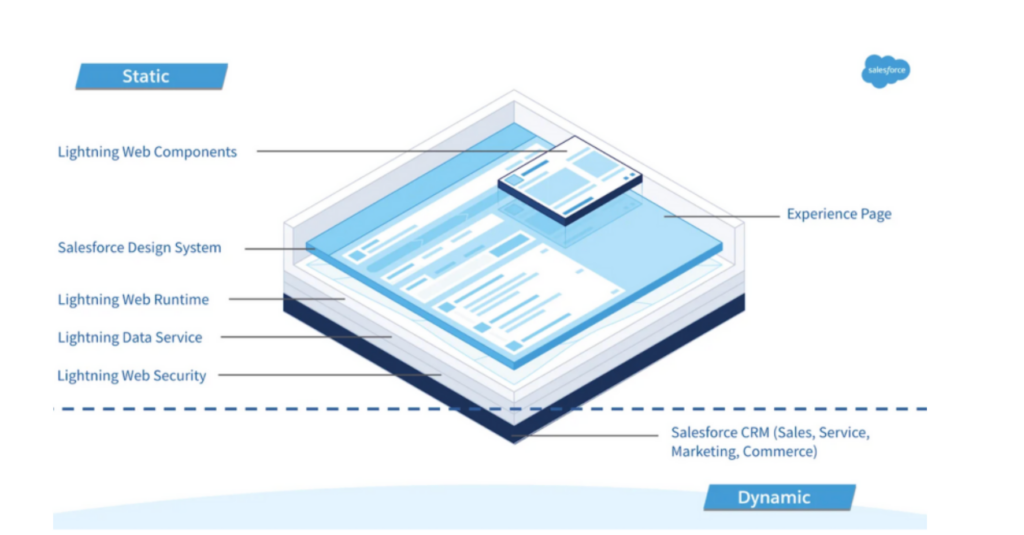Table of Contents
As Salesforce continues to consolidate its position as the market-leading CRM platform, more organizations are relying on Salesforce B2B Commerce to create and manage their B2B eCommerce storefront. In 2022, Salesforce B2B Commerce market share grew to over 15%, with more than 16,000 companies using the software.
The benefits of Salesforce’s commerce cloud are:
- Seamless brand experiences
- Brand story customization
- Streamline customer service
- Brand-mobile optimized design
- Social media extensions
- Blend digital with in-store
TradeCentric enhances Salesforce commerce cloud by:
- Effortlessly managing integration requests for a smooth customer experience
- Providing commerce cloud users with real-time, accurate data on prices and inventory
- Streamlining processes, offering an enhanced and responsive customer experience
This blog takes a deep dive into Salesforce Commerce Cloud, including an overview of the platform, features, benefits, and how TradeCentric’s B2B Connected Commerce solutions help Salesforce users maximize value.
Defining Salesforce Commerce Cloud
Salesforce Commerce Cloud, formerly recognized as DemandWare, redefines eCommerce by delivering a seamless, unified experience tailored to inspire personalized shopping journeys across all channels. SFCC empowers brands to shape customer journeys through data-driven touchpoints and artificial intelligence, providing a holistic perspective on shoppers and buyers.
This cloud commerce solution stands out as a pinnacle in unified commerce, integrating cloud technology for optimal eCommerce performance.
6 Features and benefits of SFCC
As of 2023, nearly 27% of business is conducted online, illustrating the need for a modern, seamless customer journey and online shopping experience. As a cloud based eCommerce platform, SFCC allows businesses to create personalized shopping experiences. It inspires business buyers with the confidence they need to make large or frequent purchases and, in turn, establish brand loyalty.
With its comprehensive features for customization, merchandising, and customer experience optimization, Commerce Cloud enables retailers to engage with their business customers across multiple channels. Whether through web, mobile, social media, or in-store experiences, consistent and personalized interactions can be delivered at every touchpoint. By harnessing the power across channels, SFCC empowers retailers to meet their customers wherever they are.
1. Seamless Brand Experiences
SFCC’s storefront applications enable the rapid development and launch of modern, feature-rich sites. With responsive design, multilingual support, and multicurrency logic, cart and checkout processes leverage all devices to maximize conversions, incorporating saved carts and optimizing user experiences.
2. Brand Story Customization
Elevate the shopping experience with an extensive library of prebuilt, certified integrations. These include payment accelerators, ratings and reviews, and loyalty programs, allowing for flexible customization of brand stories.
3. Streamlined Customer Service
Real-time integration into the digital storefront and shopper history equips customer service teams to swiftly expedite over-the-phone orders and streamline checkout processes on behalf of customers.
4. Build Mobile-Optimized Design
Leverage scalable APIs to construct mobile commerce apps, utilizing a comprehensive development cloud and certified LINK technology partners.
5. Social Media Extensions
Effortlessly extend marketing efforts through various social channels and online communities, including Instagram, Facebook, LinkedIn, and more.
6. Blend Digital with In-Store
SFCC’s In-Store Integrations seamlessly extend digital shopping experiences into physical stores. This prevents lost sales by incorporating an endless aisle approach with powerful customer journey capabilities.
History: From Demandware to Salesforce Commerce Cloud
The evolution of SFCC is intricately tied to its predecessor, Demandware, marking a significant chapter in the history of digital commerce platforms. Founded in 2004, Demandware established itself as a leading eCommerce solution, providing businesses with robust tools for managing online transactions.
In 2016, Salesforce, a global leader in customer relationship management (CRM), acquired Demandware, subsequently rebranding it as Salesforce Commerce Cloud. This strategic move aimed to seamlessly integrate eCommerce capabilities into Salesforce’s broader suite of customer-focused solutions.
The transition not only retained the strengths of Demandware but also infused the platform with the innovative and expansive ecosystem synonymous with Salesforce. This history underscores SFCC’s journey from its roots in Demandware to becoming a pivotal player in the dynamic landscape of modern digital commerce.
Salesforce frameworks
Salesforce Commerce Cloud has two main frameworks: Aura and Lightning Web Components (LWC). Aura is the older framework, great for making dynamic and scalable components for user interfaces. Lightning Web Components (LWC) is the newer and lighter framework, emphasizing better performance and simpler development.
LWC is all about creating reusable components to make online experiences more engaging. With these frameworks, Salesforce Commerce Cloud gives businesses the flexibility to choose the approach that suits their development needs and preferences.

Image source: Salesforce
The TradeCentric Platform is designed to seamlessly integrate with all Salesforce frameworks, including Aura and LWR, through our Salesforce Commerce Cloud connector.
- Support for users migrating from Aura to LWR whenever they decide to make the move
- Elimination of the need to rebuild connections post-migration from Aura
- Time and resource savings for IT teams through proactive testing and maintenance of the connector by TradeCentric on behalf of customers
Documentation Resources
For users looking to learn more about SFCC, you can find documentation on the official Salesforce Commerce Cloud Developer Center. The documentation covers a wide range of topics, including platform fundamentals, architecture, development, and best practices.
AI Driven Actions in Salesforce
Leveraging AI capabilities in Salesforce Commerce Cloud has become even more powerful with the recent addition of AI Generative Pre-trained Transformer (GPT) features. This enhancement brings greater flexibility to the platform, allowing B2B, B2C, and D2C sellers to boost automation, drive sales, and swiftly adapt to evolving customer needs.
Through GPT-driven actions, suppliers can efficiently set up and optimize digital storefronts, personalize each customer’s shopping journey, and leverage first-party data for stronger customer relationships. The AI-powered insights in Commerce Cloud also empower suppliers to manage products, pricing, and catalogs, launch new campaigns and promotions, assist buyers in navigating the site, and elevate customer engagement through personalized product recommendations and offers.
SFCC Certifications
Salesforce Commerce Cloud offers certifications to validate expertise in its platform, including:
- B2C Commerce Developer Certification: Validates skills in developing, customizing, and implementing Salesforce B2C Commerce solutions.
- B2C Solution Architect Certification: Demonstrates proficiency in designing and implementing Salesforce B2C Commerce Cloud solutions.
- B2C Commerce Business Practitioner Certification: Focuses on business-oriented skills for individuals involved in implementing and managing Salesforce B2C Commerce Cloud solutions.
Visit the Salesforce Certification website to learn more.
How TradeCentric Helps Salesforce Users

Salesforce Commerce Cloud users leverage TradeCentric’s B2B connected commerce to accommodate integration requests while improving the customer experience by providing real-time, accurate data on negotiated prices and inventory. Benefits include:
- Effortlessly manage integration requests for a smooth customer experience
- Provide Salesforce users with real-time, accurate data on prices and inventory
- Streamline processes, offering an enhanced and responsive customer experience
The TradeCentric & Salesforce Advantage
Salesforce trusts TradeCentric to provide B2B commerce integration capabilities that extend and enrich the power of the Salesforce B2B Commerce Cloud.
TradeCentric offers the only Managed Package for B2B eCommerce integration on Salesforce AppExchange, enabling users to effortlessly unlock new channels and expand their integration capabilities without disrupting business processes.
TradeCentric’s pre-built Salesforce Commerce managed package makes updates such as the LWR framework for new and existing Salesforce customers seamless and pain-free. To learn more about our support and enhancements for Salesforce, contact us now.




